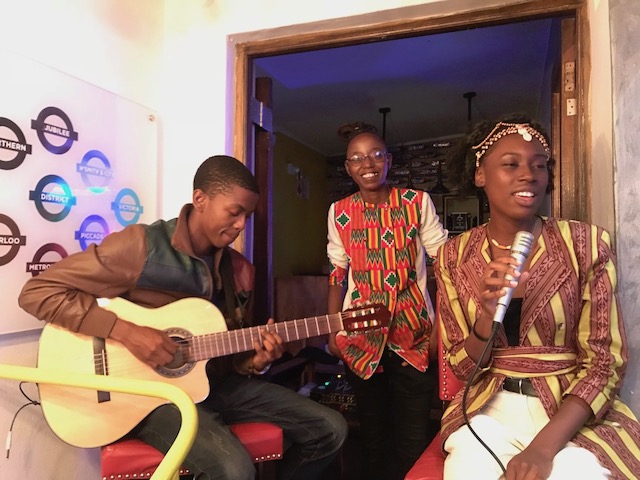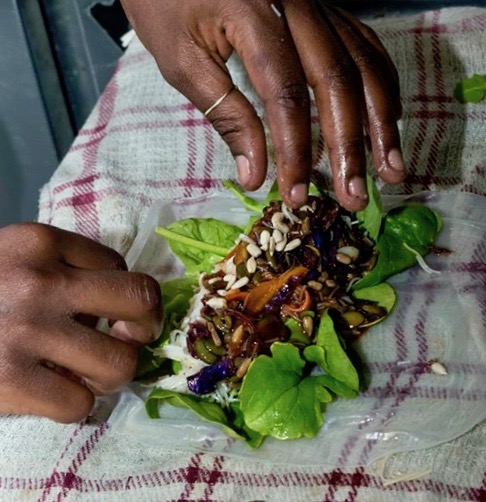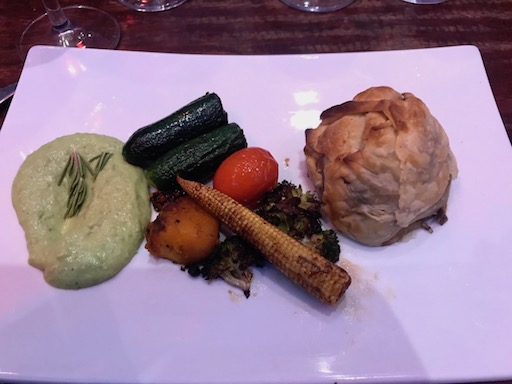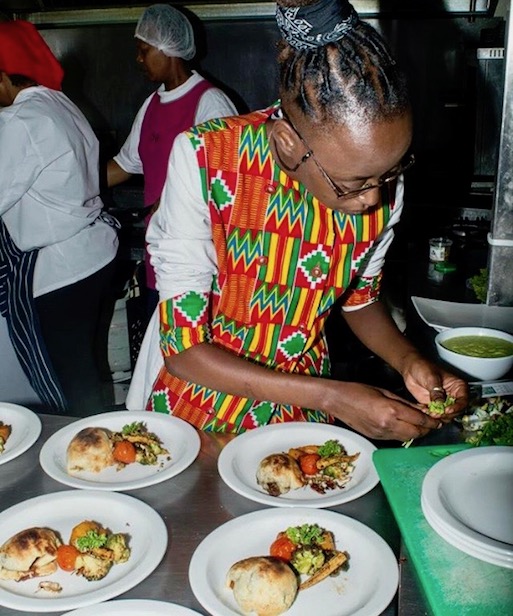Next pop -up dinner: 27 March at The Station on Bree Street.

Chef Cola (centre) at The Station on Bree Street, accompanied by Afro-soul singer Tatenda wekwaTenzi
Nicola Kagoro, better known as Chef Cola, is a Zimbabwean vegan chef and she is on a mission to popularise and spread veganism. Although she is not a strict vegan herself, she believes forthrightly that veganism is essential if our planet is going to survive.
She is part of a worldwide movement that is convinced that industrial meat production is destroying the global environment and the overconsumption of meat is ruining the health of millions of people. She believes Africa needs to join that movement.
Yet veganism would seem to be incompatible with traditional African culture, where animal slaughter is an integral part of rites of passage and animal sacrifices are an essential element in ancestor worship. There is also a strong patriarchal discourse around eating meat – the “macho steak” as Cola puts it. Women seem to be the leading voices on veganism in Africa.
But Cola says she is not disrespecting anyone or anyone’s belief nor dictating to others how they should live. Rather, she is trying to persuade people to adopt a vegan lifestyle for the sake of the world and their health.

Cola is originally from Harare and she didn’t have a traditional childhood. Part of her upbringing was on Roosevelt Island, Manhattan, New York, from the age of three to 11. Her mom was a diplomat, now retired, and a single parent. “New York shaped me … My work ethic … I move with speed,” says Cola.
It was while studying Hospitality Management at the International Hotel School that she realised her calling was as a chef. She trained as a line chef at first. Then for several years she worked at Plant, Cape Town’s first exclusively vegan restaurant, and honed her skills on the job. Her time spent at Plant opened her eyes to the health and environmental issues raised by veganism.
She returned to Zimbabwe in 2016 with her vegan ideas. She says there was some “backlash” to her proselytising veganism which is often thought of as “this white thing”. For instance, in the midst of the movement to decolonise the University of Cape Town and the heightened awareness of intersectionality, there was a racial spat after Professor David Benatar of the philosophy department proposed that no meat nor any animal products be served at faculty events. He had in mind an inclusive approach to vegans but was unmindful of excluding people who see eating meat as part of their cultural identity.
Cola isn’t too bothered by the “white culture” accusation. The current levels of meat consumption and its attendant farming practice is anything but traditional, and African cities are bursting with urban populations whose beliefs and ideas are increasingly removed from the old ways.
Another objection Cola has encountered is the misperception that veganism is very expensive. To counter this, she started a movement called African Vegan on a Budget, suggesting easy and affordable recipes.
Cola started her pop-up dinners in Zimbabwe in 2016. “It is a proud thing for me to have a brand that started in Zimbabwe,” she says. She sees it as a testament to the country’s resilience, energy and entrepreneurial spirit.
“If it wasn’t for my family it wouldn’t have happened,” she says. The whole family pitched in and pop-up ‘Dinner with Chef Cola’ were held at the family home.
She has now brought the concept to South Africa, with a three-course vegan dinner once a month at The Station on Bree Street, accompanied by Afro-soul singer Tatenda wekwaTenzi.
At her first February dinner in Cape Town she served a Vietnamese roll as a starter with the rice paper interleafed with baby spinach. The filling was vermicelli, carrot and red cabbage, accompanied by stand-out zesty lemon, basil and herb pesto sauce with roasted seeds.
Cola says she deliberately looked East; she doesn’t want to be boxed-in as a black chef expected to produce traditional African meals which happen to be vegan or to make vegan versions of African cuisine.

The main course was her signature dish, “beet-wellington”, a vegan take on a British colonial favourite, beef Wellington, with a whole, red beetroot baked inside crisp, puff pastry. It was served with caramelised baby corn, roast cherry tomato, butternut, and chargrilled broccoli, with a pea and coconut purée.
Dessert was a flute of very sweet champagne-lemon granita.
Cola hopes to hold pop-up dinners in cities across Africa and eventually have her own television series.

